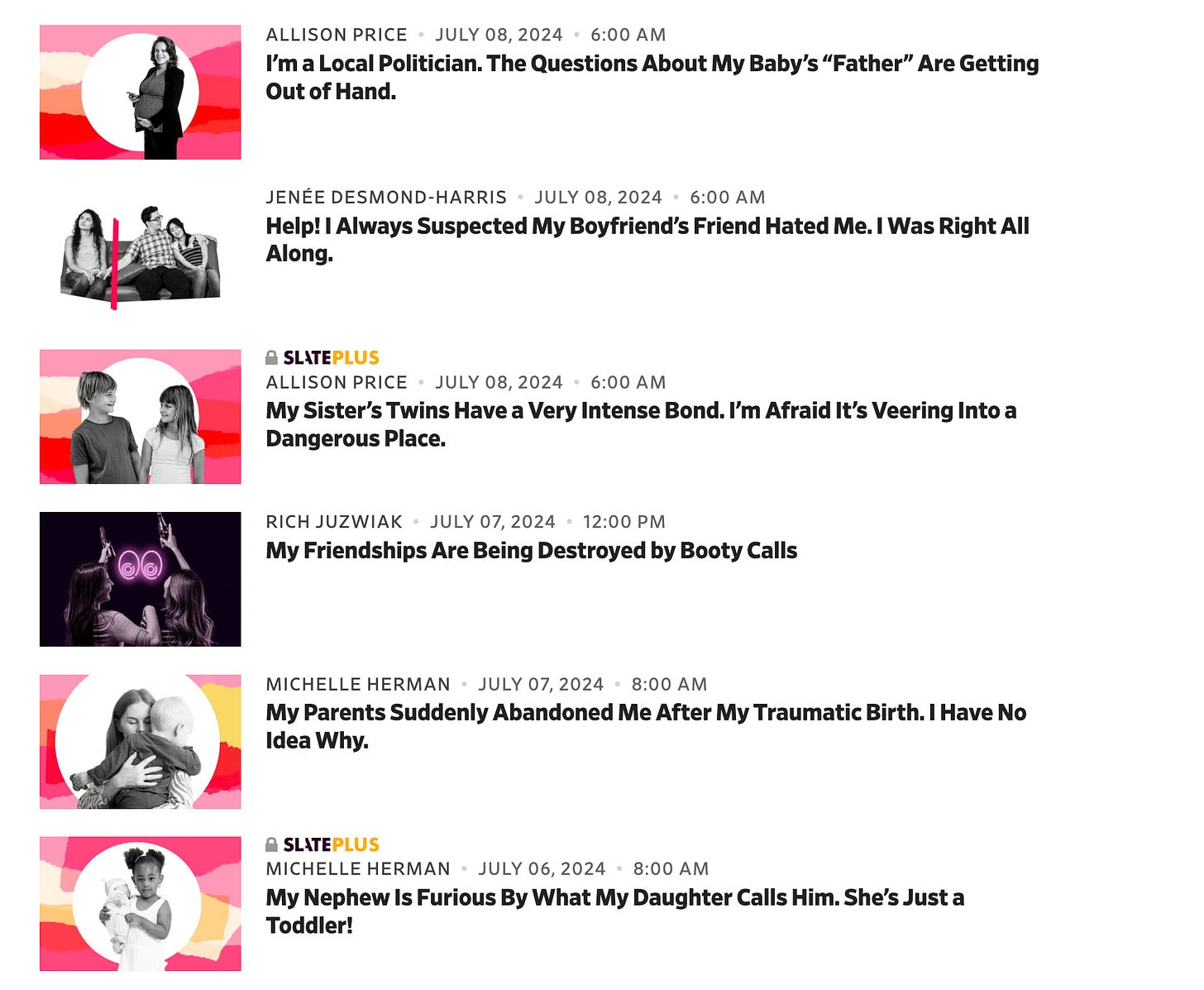Maybe you took some time off the internet last week and missed one of my favorite Culture Study interviews…..ever? It’s peak Culture Study in so many ways. You’re gonna love it.
And this week’s episode of The Culture Study Podcast is one of my favorites we’ve recorded: I talk to Chelsea Devantaz about the rich text that is J.Lo — we go into the Mariah feud, the class and race-coded backlash directed at Bennifer 1.0, how she gives us so much and yet offers so little, and so much more. Click here to listen wherever you get your podcasts — and find the episode post, including all the glorious show notes, here.
When I was a college professor I gave a lot of bad advice, much of it related to grad school. Like so many of us who find ourselves in a place of dubious security and worth, I subconsciously bolstered my sense of self by advising others to reproduce it. In other words: if other smart, hard-working kids continued going to grad school, it would somehow underline that we all had made a good life choice. Just so we’re clear: this is very bad advice.
I found myself in the position of giving bad advice in part because I, myself, had received bad advice. From my advisor, from other professors throughout my time in grad school, from my dissertation advisor. None of it was malicious; most of it (like my own bad advice) was delivered with the best intentions. Bad advice comes easy. Good advice comes hard.
Most advice is bad because it prescriptively flows from personal experience: experience that, in many cases, happened many decades in the past. I did this, so you should do this too. My professors’ advice when it came to grad school was bad because they hadn’t been in grad school (or, more importantly, experienced the reality of the post-graduate job market) for a decade if not more. The academia they chose was not the academia I would be choosing; the understanding of “how things worked” had shifted in profound ways. The only good advice I received as a grad student was from someone who’d graduated pre-Great Recession and said very frankly: all the rules have changed.
Which is another way of saying: good advice is contextualized. It accounts and expands for difference. Bad advice delivers itself as universal. See: every conversation with older generations (and boomers in particular, because of the specifics of the economy they inherited) about what you should be doing to afford college or a home and how much money you should have saved for retirement. The paradigms of college tuition, home ownership, and retirement have all shifted; the advice, in so many cases, has not.
Parenting advice is often bad because kids are magnificently unique creatures and so are their caregivers. Gardening advice is worthless without piles of information on where someone is gardening, their soil type, their level of expertise, their access to various gardening tools, and the amount of time they have to deal with the problem. In the various online gardening forums I frequent, the biggest tension is between people asking for advice (without providing any context) and people spending a lot of time and effort to offer it.
There’s a difference in the advice you’d offer a novice dahlia grower and an experienced one, for example, if they posted a picture of a mottled leaf and asked “what’s going on here?” Same for someone posting a picture of collapsed bread loaf, or a crooked bannister. Without context, you end up telling people something they already know (and maybe know better than you) or confusing them with too much detail.
It’s increasingly hard to connect good writing with eager audiences on the internet. Blame the continuing decline of the “social web” where people discovered new writing; blame the gutting of culture writing in general; blame internet fatigue. But you know what people are still reliably reading? Advice. I’m a sucker for the Slate headline style (“I Sent Pictures of My Family to My Grandmother. What She Did Next Was the Ultimate Betrayal” and “My Neighbor Ran Up to Me at the Mailbox With a Wild Accusation. I Don’t Believe It”) which have helped turn their columns into a massive traffic (and subscription) engine for the site. New York Magazine now has columns by Esther Perel, Emily Gould, and co-publishes J.P Brammer’s ¡Hola Papi!; the New York Times has Work Friend, The Ethicist, and Social Q’s; Heather Havrilesky’s beloved Ask Polly Substack has more than 100,000 subscribers.
Some of these are classic advice columns. And some of them are the new secret home for the personal essay. In many cases, the questions themselves often strike me more as prompts. Someone tells a wild or weird or distinctive story about their life and something about it that’s currently troubling them. If it’s not embellished, it’s certainly (and necessarily) highly subjective: here’s how I see things happening, here’s (often) an invitation for you to tell me that I’m in the right.
The classic advice columnists answer in the Dear Abby/Ann Landers mode: here’s what you should do, and here's why you should do it immediately. Many of the Times columnists still function in this mode, a manifestation of both audience expectations and print space limitations. But online columnists have few restrictions, and often employ writers better known for their style (and insight!) than their knowledge of etiquette. Hence: the advice column as off-centered personal essay.
The best known entry in this genre is probably Cheryl Strayed’s “Ghost Ships,” written during her tenure as Dear Sugar for The Rumpus. The question she answers (in short: “how do you know if you should have kids?”) is a common one — which is part of why the answer works so well.
“I’ll never know and neither will you of the life you don’t choose,” Strayed concludes. “We’ll only know that whatever that sister life was, it was important and beautiful and not ours. It was the ghost ship that didn’t carry us. There’s nothing to do but salute it from the shore.”
The lack of context isn’t a problem here, because Strayed’s not actually telling the asker whether or not he should have kids. She’s offering the wisdom of her own life. She’s not telling the asker what to do so much as inviting them to ask themselves some questions (instead of her).
If you’ve hung out on the internet much in the last decade, you’ve probably seen this essay at some point. I see it pop up in the Advice Thread here several times a year, with dozens of people chiming in to say how much they love it. It’s a beautiful piece of writing, but that’s an inadequate explanation of its endurance. The question itself might seem common — many of us have grappled with this same scenario or are grappling with it now.
But it is still pretty generationally novel: the vast majority of our parents’ and grandparents’ generation never thought of “do I want to have children” as a choice. It just happened: because it was the only way out of your parents’ house, because it was the only way to be a part of mainstream society, because you didn’t have any other way modeled for you. If you didn’t have children, it was rarely because you didn’t want them; it was because, for whatever reason, you couldn’t. Plus, your parents and grandparents are pretty crappy sources of wisdom, as all of them in some way became parents themselves, and even if they did regret the decision, it’s still very difficult to tell your actual children as much with any amount of grace. Sometimes good advice requires more information (and, by extension, intimacy); in this situation, you actually need less.
As a result, there was (and still is) a paucity of good advice on what it means to greet the prospect of creating a family as a choice. Strayed was able to look at her own life, and the choices she did and did not make, and create an open paradigm for others to place on their own lives — one that did not have to be freighted with judgment. (This isn’t my favorite essay about thinking about having kids because you still have the knowledge that the person writing the answer had kids, which has the effect of tilting the scales — but I’m also reacting from the perspective of someone who took the sister ship).
Some advice column answers take the question asker to task — telling them to do some serious work on themselves. I find my pleasure in these answers twisted: the advice feels so right….but also so brutal that the person asking will likely immediately reject it. We’re very reticent to see ourselves and our actions clearly, so we come up with reasons why the mirror is defective. Is it good advice if you can’t hear it? Is this why an essay — rooted in the personal, but extendable to the reader — can feel so much more effective?
I’ve been thinking through these questions as I’ve watched my own advice age. A journalist I admire emailed me a few months ago to talk about her options, and I felt at a total loss. Doors that were open to me aren’t just shut; the entire building has been demolished. I felt that way talking to journalism students in the Spring, too. I don’t want to be demoralizing, but I also feel irresponsible regurgitating the scrappy advice I gave in my 30s. How do you say figure out your actual strengths, not your perceived ones without sounding like a chode? Is no advice better than old advice? How can I offer less advice and more wisdom, but without sounding reductive or saccharine?
I’m clearly still working through all of this, so instead of putting a tidy bow on this essay, I’m going to offer an incomplete list of what I’m working on to that end (both here in the newsletter and in the broad advice section of the podcast):




